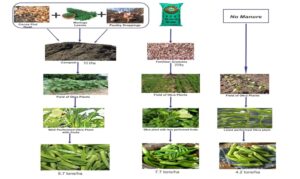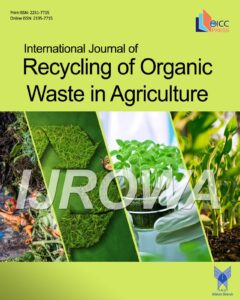
Purpose: Integrating vermicompost and hydroponics in rice agriculture presents an innovative and sustainable solution for transforming organic waste into valuable resources. This review explores the possible utilization of organic waste into productive resources through vermicompost and hydroponics in rice agriculture. Method: A comprehensive literature review was conducted to investigate the potential use of vermicompost derived […]
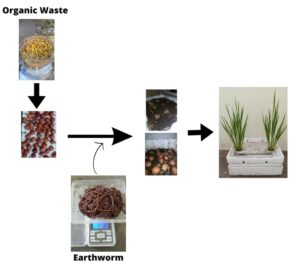
Purpose: The study investigated the growth and yield of cucumber cultivars under the influence of the organic fertilizers application. Method: A 4 x 5 factorial combination of four cucumber cultivars (Poinsett, Marketer, Marketmore, and Darina hybrid) and four organic fertilizers (Sunshine, Aleshinloye, Gateway, KWASU organic-based fertilizer-KOBF, and the control) in a completely randomized design at […]
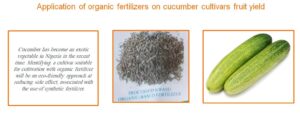
Purpose: Vegetable waste (VW) composting was assessed using a passive aerated pilot-scale composter at Kundasang, Sabah. The passive aerated composting system proposed at Kundasang Community Composting Site (KCCS) was analyzed for its techno-economic impact. Method: The composting performance (temperature, organic matter loss, moisture content, pH value, electrical conductivity, and nutrient value) of 500 ± 2 […]
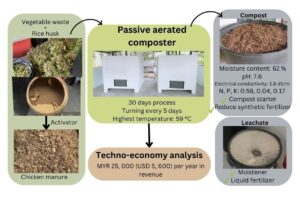
Purpose: This study aimed to evaluate vermicompost derived from various local organic wastes as a nursery material for cultivating cabbage and chili seedlings, converting organic waste into fertilizer through vermicomposting. Method: Local organic materials, including cow dung, spent mushroom waste, and coffee grounds were utilized as the main substrates for earthworm bedding. Three main substrates, […]
Purpose: Wood ash is an important alternative source of inorganic potassium especially for farmers in areas with acidic soils. Method: The experiment was carried out in two phases. In the first phase, treatments consisted of the application of inorganic fertilizer sources (0 kgha-1, 130.44 kgha-1 of urea, and 300 kgha-1 of NPK of 20:10:10) and […]
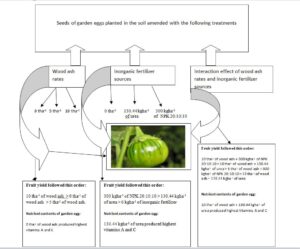
Purpose: Clean and efficient alternatives for sustainable treatment of pig farming wastes are a priority in suburban areas in Forest Reserves of High Andean ecosystems. Among these technologies are Bokashi Fermentation and composting with added microorganisms (bioaugmentation) or nutrients (biostimulation) as biological activators. Method: In a Colombian rural area located at 3160 m.a.s.l., focused on […]
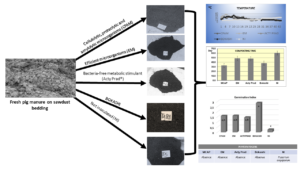
Purpose: Modern agriculture heavily relies on the use of synthetic fertilisers, which are expensive and associated with significant environmental risks. Hence, it is necessary to focus on developing integrated farming practices that encompass cost-effective synthetic fertilisers. Method: The present experimentation was carried out to assess the effect of various treatments comprised of fermented liquid bio […]
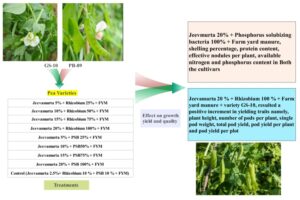
Purpose: The growing adverse effects of agrochemicals on environmental health and safety warrant an examination of ecologically safe alternatives for weed control. The objective of this study was to determine the effect of rice-husk waste on the growth performance and weed management (WM) of Ocimum sanctum. Method: In a randomized complete block design with three […]
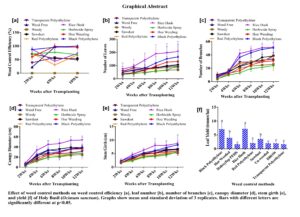
Purpose: Globally, Colombia is recognized as a coffee-growing country par excellence, which entails generating a large amount of coffee waste. This narrative study aims to review the possible use of such coffee waste to obtain nutrient-rich compost following key composting processes. The final is to investigate the importance and suitability of this compost type. Method: […]
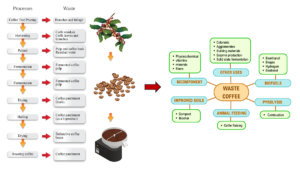
Purpose: Millicompost is an organic substrate generated by the activity of millipedes (diplopods) with high potential for seedling production. This work aimed to evaluate the performance of green curly lettuce (Lactuca sativa L.) using seedlings produced with millicompost, at different levels of nitrogen (N) fertilization at seedling transplant, in an organic production system. Method: […]
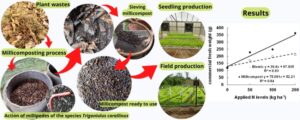
Purpose: Cocopeat resources in Iran are limited and unsuitable, and they must be imported from abroad at a high cost. It is therefore essential to evaluate suitable growth media to replace cocopeat. Method: During this experiment, we conducted a completely randomized experimental design with seven types of growing media in a greenhouse with two layers […]
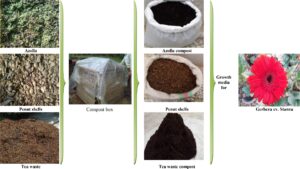
Purpose: The limitation of the use of some agricultural wastes is their C/N ratio. This study was aimed at integrating cocoa pod husk, moringa leaves, and poultry droppings in composted form for enriched soil amendments for vegetable production. Method: Three compost types: cocoa pod husk, moringa leaf, and poultry droppings were composted for 60 days […]
